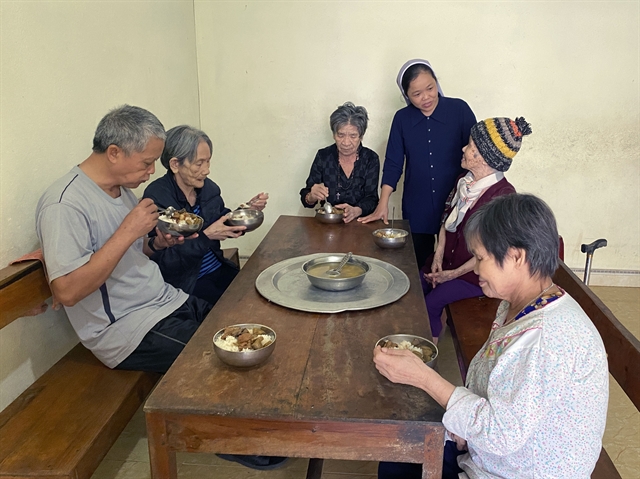 Society
Society


|
| Homeless elderly people having lunch at Thiên Ân Charity Centre in Tràng Lưu, Hà Tĩnh. VNA/VNS Photo Hữu Quyết |
HÀ TĨNH — 60-year-old Nguyễn Ánh Tuyết from Phúc Đồng, Hương Khê District, the central province of Hà Tĩnh, has been residing at Thiên Ân Charity Centre in Tràng Lưu parish for almost 5 years.
Faced with a severe illness, unemployment and no family support, Tuyết relies on the centre, based in Lộc Yên Commune, Hà Tĩnh, for her ongoing care.
Tuyết worked as a labourer for almost 10 years but fell seriously ill and couldn't continue. Fortunately, when the Thiên Ân Charity Centre was set up, the nuns provided her with healthcare, daily meals and accommodation.
Tuyết is just one of 35 unfortunate people that Thiên Ân Charity Centre is currently nurturing, including orphans, disabled individuals, those abandoned, and elderly people without support. The centre has ten catholic nuns working alternately every day to take care of these people.
Sister Maria Hà Thị Mão shares that there are diverse circumstances and age groups here, requiring individualised care for each case. In particular, the centre has many elderly and severely disabled individuals, and the nuns have to dedicate time to care for them 24/7.
"For the elderly and small disabled individuals who are not mobile, the nuns have to assist each one with eating, bathing, and changing diapers regularly to maintain hygiene. For mildly disabled or orphaned children who can go to school, the nuns help them in their learning process and provide transportation to school," Mão adds.
Established in 2015, Thiên Ân Charity Centre supports disadvantaged cases from various regions, including Thanh Hóa, Quảng Trị and Hà Tĩnh provinces. The centre’s limited finances mainly rely on contributions from generous individuals, posing challenges to caring for these individuals.
Sister Maria Trương Thị Lý, the centre's manager, notes ongoing facility and daily necessities challenges. The nuns operate a bottled water facility for income, but it's not sufficient. They aim to repair and renovate facilities for better living conditions and seek assistance from compassionate individuals and benefactors, both near and far.
Another notable charity organisation is Hồng Phúc Shelter for Orphans and the Disabled, located in Thổ Hoàng Parish (Điền Mỹ Commune), currently taking care of over 20 unfortunate people, including orphaned children, abandoned ones, or those with congenital disabilities.
Sister Nguyễn Thị Nhường of Hồng Phúc Shelter mentions her facility's founding in 2009, initially accommodating eight individuals without a place to stay.
Over the years, the shelter has welcomed numerous exceptionally challenging cases, offering them a place of support, love and protection.
These charitable homes in Hương Khê District have become a shared home for those in need, helping them have a family and bringing more hope to these unfortunate lives. To provide some support and encouragement to these centres, local authorities frequently visit and give gifts on occasions such as the Mid-Autumn Festival, Children's Day and Christmas.
Hà Văn Đàn, Chairman of the Hương Khê District Fatherland Front Committee, shares that the voluntary centres in the district affiliated with Catholic establishments offer unbiased care to those in need, irrespective of religious beliefs. The district party committee and local government consistently support these centres in infrastructure, regular visits and festive gift-giving.
According to Đàn, in the future the committee hopes that organisations, individuals, and compassionate people will continue showing interest and providing resources for these centres to fulfil their mission — supporting the elderly living alone, the sick and disabled, and orphaned children in integrating into the community. — VNS




